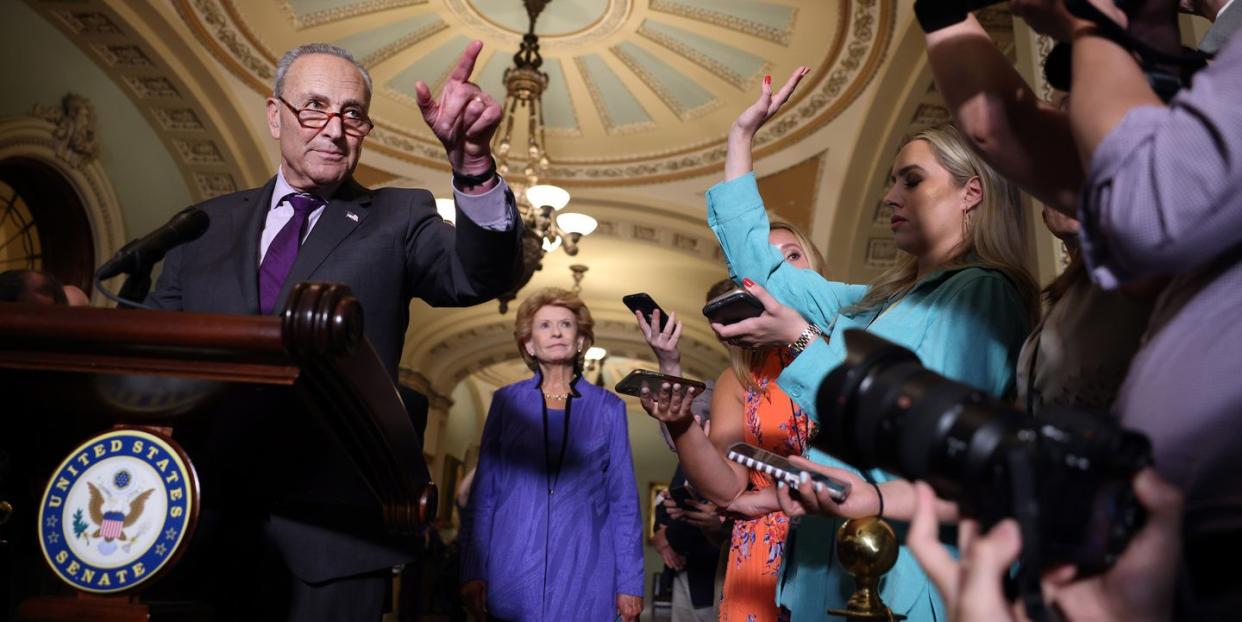If the Senate Is Serious About Ending Endless Wars, It Should Focus on the 2001 AUMF

- Oops!Something went wrong.Please try again later.
- Oops!Something went wrong.Please try again later.
On Wednesday, Senate Majority Leader Chuck Schumer appeared to signal the completion of a major shift in Democratic—and American—politics. "I strongly and fully support repealing the 2002 reauthorization for the use of military force in Iraq," he said on the Senate floor. "It's the first time I'm formally announcing my support for repeal." He announced a bill from Senators Tim Kaine and Todd Young—bipartisanship???—would get consideration by the Senate Foreign Relations Committee and then a full vote in the Senate. This is the culmination of a growing push, with support from the Biden White House, to repeal the 2002 AUMF. It seems like a major milestone on the way to unwinding America's endless wars.
Except that the 2002 AUMF has very rarely been cited as the sole justification for U.S. military intervention abroad since the Iraq war was declared over in 2011. The Trump administration did use it—or at least a wild extension thereof—to justify the airstrike that killed Iranian general Qassem Soleimani in January 2020. The Obama administration used it as an "alternative statutory basis" to justify airstrikes against ISIS in 2014, but the main basis was the 2001 AUMF. That's the piece of legislation that's actually getting a workout all over the world. "The 2001 is the one that grants the president broad authority to extend the war wherever and however he pleases," Stephanie Savell of Brown University's Costs of War project told me. That's because it boasts language offering the executive such broad authority that the only member of Congress to vote against it, Barbara Lee, warned colleagues, "We must careful not to embark on an open-ended war with neither an exit strategy nor a focused target." She added in an op-ed from September 23, 2001:
It was a blank check to the president to attack anyone involved in the September 11 events—anywhere, in any country, without regard to our nation's long-term foreign policy, economic and national security interests, and without time limit. In granting these overly broad powers, the Congress failed its responsibility to understand the dimensions of its declaration. I could not support such a grant of war-making authority to the president; I believe it would put more innocent lives at risk. The president has the constitutional authority to protect the nation from further attack, and he has mobilized the armed forces to do just that. The Congress should have waited for the facts to be presented and then acted with fuller knowledge of the consequences of our action.
In the years since, Lee has been completely proven right. As we detailed in Esquire's Summer Issue, the United States is, according to the Costs of War project, involved in some kind of counterterrorism operations in 85 different countries, including Mali, Kenya, Bangladesh, Indonesia, Somalia, Niger, Kazakhstan. We've got drones over the Mideast and Special Forces operating throughout Africa. And usually, the justification for these individual operations is an expanded definition of the 2001 AUMF—an expansion rubber-stamped by both the Bush and Obama administrations, the latter in order to embark on that Syrian bombing campaign. Suddenly, the authorization also applied to "forces associated with al Qaeda and the Taliban as co-belligerents." The Executive Branch that claimed the power also defined what constituted associated forces.

You can see the problems here. It is the ultimate expression of the imperial presidency that both parties have allowed to grow and flourish in recent decades. One of the many ramifications of congressional dysfunction (driven in part by the Senate filibuster) is that the federal legislature's powers have steadily accrued to other branches of government. The constitutional prerogative of Congress to declare war has now been handed over, in practice, to the executive. When did we declare war on Somalia? And yet we're there. Just one piece of our $6 trillion project.
(And then there's the 127 Echo program.)
The move to repeal the 2002 AUMF is welcome, particularly because, as the Trump administration demonstrated, it can also be exploited by the executive to justify unilateral decisions of war and peace. But if Schumer is serious about reclaiming the war powers of Congress—and ending our endless wars—then the 2001 AUMF will have to go, too. The Biden White House, like every administration, is fused to the extended military and intelligence apparatus. You get the sense it might not be enthusiastic about ceding its authority to conduct counterterrorism operations wherever it pleases—or at least, wherever the local government lacks the power or the will to prevent U.S. intervention.
And we know how the intervention ends. When the smoke clears, there are always new enemies. More bombs to drop, and give to our friends to drop. Eventually, this has to stop. It would help if the Legislative Branch, and its many individual members who have absolved themselves of responsibility for these endless conflicts by ensuring they never have to go on the record about them, would take some of that responsibility back.
You Might Also Like

